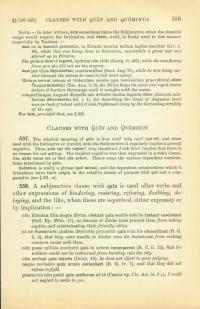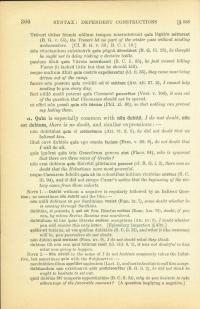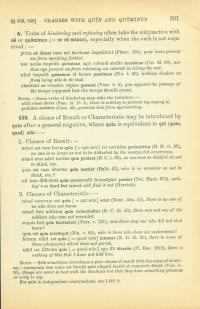557. The original meaning of quīn is how not? why not? (quī-nē), and when used with the Indicative or (rarely) with the subjunctive it regularly implies a general negative. Thus, quīn ego hōc rogem? (why shouldn't I ask this?) implies that there is no reason for not asking. The implied negative was then expressed in a main clause, like nūlla causa est or fierī nōn potest. Hence come the various dependent constructions introduced by quīn.
Quōminus is really a phrase (quō minus), and the dependent constructions which it introduces have their origin in the relative clause of purpose with quō and a comparative (see § 531.a).
558. A subjunctive clause with quīn is used after verbs and other expressions of hindering, resisting, refusing, doubting, delaying, and the like, when these are negatived, either expressly or by implication.
Nōn hūmāna ūlla neque dīvīna obstant quīn sociōs amīcōs trahant exscindant. (Sall. Ep. Mith. 17)
No human or divine laws prevent them from taking captive and exterminating their friendly allies.
ut nē Suessiōnēs quidem dēterrēre potuerint quīn cum hīs cōnsentīrent (B. G. 2.3)
that they were unable to hinder even the Suessiones from making common cause with them
nōn posse mīlitēs continērī quīn in urbem inrumperent (B. C. 2.12)
that the soldiers could not be restrained from bursting into the city
Nōn recūsat quīn iūdicēs. (Deiot. 43)
He does not object to your judging.
Neque recūsāre quīn armīs contendant. (B. G. 4.7)
And that they did not refuse to fight.
Praeterīre nōn potuī quīn scrīberemad tē. (Caesar ap. Cic. Att. 9.6A)
I could not neglect to write to you.
Trēverī tōtīus hiemis nūllum tempus intermīsērunt quīn lēgātōs mitterent. (B. G. 5.55)
The Treveri let no part of the winter pass without sending ambassadors.
[cf. B. G. 5.53; B. C. 1.78.]
Nōn cūnctandum exīstimāvit quīn pūgnā dēcertāret. (B. G. 3.23)
He thought he ought not to delay risking a decisive battle.
Paulum āfuit quīn Vārum interficeret. (B. C. 2.35)
He just missed killing Varus
(it lacked little but that he should kill)
Neque multum āfuit quīn castrīs expellerentur. (id. 2.35)
They came near being driven out of the camp.
Facere nōn possum quīn cotīdiē ad tē mittam. (Att. 12.27.2)
I cannot help sending to you every day.
Fierī nūllō modō poterat quīn Cleomenī parcerētur. (Verr. 5.104)
It was out of the question that Cleomenes should not be spared.
ut efficī nōn possit quīn eōs ōderim (Phil. 11.36)
so that nothing can prevent my hating them.
a. Quīn is especially common with nōn dubitō (I do not doubt) nōn est dubium (there is no doubt) and similar expressions.
Nōn dubitābat quīn eī crēderēmus. (Att. 6.2.3)
He did not doubt that we believed him.
Illud cavē dubitēs quīn ego omnia faciam. (Fam. 5.20.6)
Do not doubt that I will do all.
Quis īgnōrat quīn tria Graecōrum genera sint? (Flacc. 64)
Who is ignorant that there are three races of Greeks?
Nōn erat dubium quīn Helvētiī plūrimum possent. (cf. B. G. 1.3)
There was no doubt that the Helvetians were most powerful.
Neque Caesarem fefellit quīn ab iīs cohortibus initium victōriae orīrētur. (B. C. 3.94)
And it did not escape Cæsar's notice that the beginning of the victory came from those cohorts.
Note 1— Dubitō without a negative is regularly followed by an indirect question; so sometimes nōn dubitō and the like:
Nōn nūllī dubitant an per Sardiniam veniat. (Fam. 9.7)
Some doubt whether he is coming through Sardinia.
Dubitāte, sī potestis, ā quō sit Sex. Rōscius occīsus. (Rosc. Am. 78)
Doubt, if you can, by whom Sextus Roscius was murdered.
Dubitābam tū hās ipsās litterās essēsne acceptūrus. (Att. 15.9)
I doubt whether you will receive this very letter.
[Epistolary Imperfect (§ 479)]
Quālis sit futūrus, nē vōs quidem dubitātis (B. C. 2.32)
And what it (the outcome) will be, you yourselves do not doubt.
nōn dubitō quid sentiant. (Fam. 15.9)
I do not doubt what they think.
Dubium illī nōn erat quid futūrumesset. (id. 8.8.1)
It was not doubtful to him what was going to happen.
Note 2— Nōn dubitō in the sense of I do not hesitate commonly takes the infinitive, but sometimes quīn with the subjunctive.
nec dubitāre illum appellāre sapientem (Lael. 1)
and not to hesitate to call him a sage
Dubitandum nōn exīstimā vit quīn proflcīscerētur. (B. G. 2.2)
He did not think he ought to hesitate to set out.
quid dubitās ūtītemporis opportūnitāte? (B. C. 2.34)
Why do you hesitate to take advantage of the favorable moment?
[A question implying a negative.]
b. Verbs of hindering and refusing often take the subjunctive with nē or quōminus ( = ut eō minus), especially when the verb is not negatived.
Plūra nē dīcam tuae mē lacrimae impediunt (Planc. 104)
Your tears prevent me from speaking further.
Nec aetās impedit quōminus agrī colendī studia teneāmus. (Cat. M. 60)
Nor does age prevent us from retaining an interest in tilling the soil.
Nihil impedit quōminus id facere possīmus. (Fin. 1.33)
Nothing hinders us from being able to do that.
Obstitistī nē trānsīre cōpiae possent. (Verr. 5.5)
You opposed the passage of the troops.
(opposed lest the troops should cross)
Note— Some verbs of hindering may take the infinitive.
Nihil obest dīcere. (Fam. 9.13.4)
There is nothing to prevent my saying it.
prohibet accēdere (Caec. 46)
prevents him from approaching
559. A clause of result or characteristic may be introduced by quīn after a general negative, where quīn is equivalent to quī (quae, quod) nōn.
- Clauses of Result:
nēmō est tam fortis quīn [ = quī nōn] reī novitāte perturbētur. (B. G. 6.39)
No one is so brave as not to be disturbed by the unexpected occurrence.Nēmō erat adeō tardus quīn putāret, etc. (B. C. 1.69)
No one was so slothful as not to think, etc.Quis est tam dēmēns quīn sentiat, etc.? (Balb. 43)
Who is so senseless as not to think, etc.?Nīl tam difficilest quīn quaerendō investīgārī possiet. (Ter. Haut. 675)
Nothing's so hard but search will find it out. (Herrick). - Clauses of Characteristic:
Nēmō nostrum est quīn [ = quī nōn] sciat. (Rosc. Am. 55)
There is no one of us who does not know.Nēmō fuit mīlitum quīn vulnerārētur. (B. C. 3.53)
There was not one of the soldiers who was not wounded.Ecquis fuit quīn lacrimāret? (Verr. 5.121)
Was there any one who did not shed tears?Quis est quīn intellegat? (Fin. 5.64)
Who is there who does not understand?Hōrum nihil est quīn [ = quod nōn] intereat. (N. D. 3.30)
There is none of these (elements) which does not perish.Nihil est illōrum quīn [ = quod nōn] ego illī dīxerim. (Pl. Bac. 1012)
There is nothing of this that I have not told him.
Note— Quīn sometimes introduces a pure clause of result with the sense of ut nōn.
numquam tam male est Siculīs quīn aliquid facētē et commodē dīcant (Verr. 4.95)
Things are never so bad with the Sicilians but that they have something pleasant or witty to say.
For quīn in independent constructions. see § 449.b.



